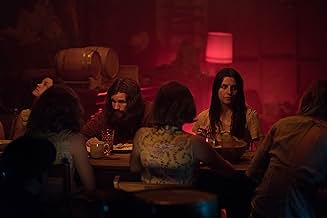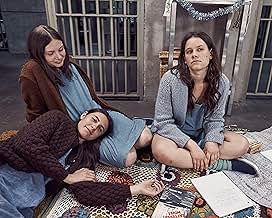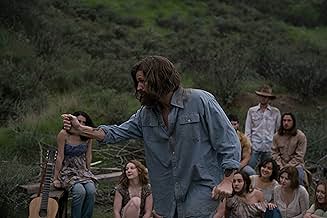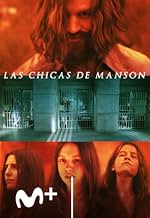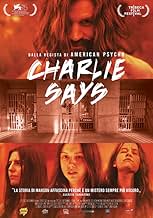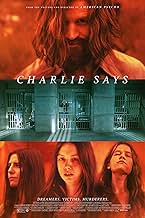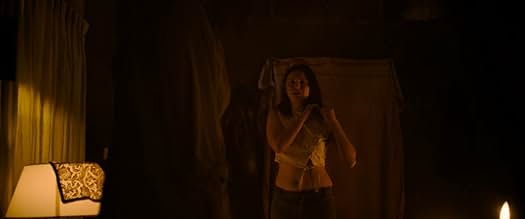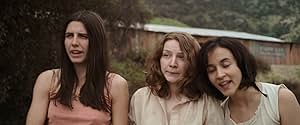CALIFICACIÓN DE IMDb
5.9/10
5.7 k
TU CALIFICACIÓN
El trágico relato de una chica estadounidense que se transformó en una asesina de sangre fría en el verano de 1969El trágico relato de una chica estadounidense que se transformó en una asesina de sangre fría en el verano de 1969El trágico relato de una chica estadounidense que se transformó en una asesina de sangre fría en el verano de 1969
- Premios
- 1 nominación en total
- Dirección
- Guionistas
- Todo el elenco y el equipo
- Producción, taquilla y más en IMDbPro
Opiniones destacadas
This movie shows a side of the story that hasn't been depicted before. That is enough to appreciate the premise.
Charles Manson was a very sexist and racist man. He used, manipulated, and brainwashed both young women AND men who he could tell were naive and vulnerable.
Anyone who has thoroughly researched the Manson family will know the women were treated worse than in this film. One disturbing example is they weren't allowed to eat until after the dogs. Feminism was really at it's zenith in the late 60s. Representing feminism in the film is realistic to the time period.
These women would have never murdered had they not crossed paths with Charles Manson. Of that, there is no doubt in my mind. Many people were living in communes at the time. The members of "The Family" ended up in the wrong one, not knowing what lay ahead, not knowing they were being groomed by a sadistic madman.
This movie isn't excellent, but it does not deserve a 5.6. Voting it down because you don't like feminism is a very very sad point of view.
6.5/10
Charles Manson was a very sexist and racist man. He used, manipulated, and brainwashed both young women AND men who he could tell were naive and vulnerable.
Anyone who has thoroughly researched the Manson family will know the women were treated worse than in this film. One disturbing example is they weren't allowed to eat until after the dogs. Feminism was really at it's zenith in the late 60s. Representing feminism in the film is realistic to the time period.
These women would have never murdered had they not crossed paths with Charles Manson. Of that, there is no doubt in my mind. Many people were living in communes at the time. The members of "The Family" ended up in the wrong one, not knowing what lay ahead, not knowing they were being groomed by a sadistic madman.
This movie isn't excellent, but it does not deserve a 5.6. Voting it down because you don't like feminism is a very very sad point of view.
6.5/10
"Charlie Says" (2018 release; 101 min.) brings the story of the Charles Manson murders, but this time for the perspective of the three "Manson women" involved in the killings. As the movie opens, one of the women is taking a shower, the blood coming off of her hair and body. We then go the "3 Years Later", and we see the three women in jail at the California Institution for Women, on a separated wing with just the three of them: Lulu, Sadie and Katie. A graduate student at UC Santa Cruz is given the opportunity to teach these three some classes. When then go back in time, to when Leslie (later named Lulu by Manson) arrives at the remote ranch where Mason and his entourage live... At this point we are 10 min. into the movie, but to tell you more of the plot would spoil your viewing experience, you'll just have to see for yourself how it all plays out.
Couple of comments: this is the latest from Canadian director Mary Herron, who previously brought us the worthwhile "I Shot Andy Warhol" and, even better, "American Psycho". Here she revisits the events that are often referred to as "having ended the 60s" (the murders took place in August, 1969). The film is based on several books, including the one written by the graduate student on specifically Leslie/Lulu, but there are certainly additional source materials on the Manson women. Indeed the eternal question seems to be: are these women victims themselves? are they just part of the gang that committed these vicious killings? The movie attempts to address that, and while at times it shows promise, in the end the movie lacks depth and what we are stuck with is something that certainly isn't a bad movie, but given the underlying facts, it feels more like a missed opportunity. Leslie/Lulu is played with conviction by up-and-coming British actress Hannah Murray. Manson is played by Matt Smith as if he's Jim Morrison (check out Smith instead in that other recent indie movie "Mapplethorpe"). Beware: there is a fair amount of nudity in the film, so if that is a concern for you, better stay away and check out another film.
"Charlie Says" premiered at last Fall's Venice film festival to ho-hum reaction, and is now getting a limited US theater release. It opened at my local art-house theater here in Cincinnati this weekend for just a one week run. The early Sunday evening screening where I saw this at was attended so-so (7 or 8 people). Maybe this will find a larger audience as it is launched on other platforms. If you have any interest in the Manson murders, and in particular the women that were involved in it, I suggest you check this out, be it in the theater (unlikely), on VOD, or eventually on DVD/Blu-ray, and draw your own conclusion.
Couple of comments: this is the latest from Canadian director Mary Herron, who previously brought us the worthwhile "I Shot Andy Warhol" and, even better, "American Psycho". Here she revisits the events that are often referred to as "having ended the 60s" (the murders took place in August, 1969). The film is based on several books, including the one written by the graduate student on specifically Leslie/Lulu, but there are certainly additional source materials on the Manson women. Indeed the eternal question seems to be: are these women victims themselves? are they just part of the gang that committed these vicious killings? The movie attempts to address that, and while at times it shows promise, in the end the movie lacks depth and what we are stuck with is something that certainly isn't a bad movie, but given the underlying facts, it feels more like a missed opportunity. Leslie/Lulu is played with conviction by up-and-coming British actress Hannah Murray. Manson is played by Matt Smith as if he's Jim Morrison (check out Smith instead in that other recent indie movie "Mapplethorpe"). Beware: there is a fair amount of nudity in the film, so if that is a concern for you, better stay away and check out another film.
"Charlie Says" premiered at last Fall's Venice film festival to ho-hum reaction, and is now getting a limited US theater release. It opened at my local art-house theater here in Cincinnati this weekend for just a one week run. The early Sunday evening screening where I saw this at was attended so-so (7 or 8 people). Maybe this will find a larger audience as it is launched on other platforms. If you have any interest in the Manson murders, and in particular the women that were involved in it, I suggest you check this out, be it in the theater (unlikely), on VOD, or eventually on DVD/Blu-ray, and draw your own conclusion.
Charlie Says is yet another take on the Manson cult/murders, but it offers a fresh perspective using a unique method of storytelling. Whereas most media about the Manson family focuses on the murders, Charlie Says is told from the perspective of the.women involved in the crimes, particularly Leslie "Lulu" Van Houten (played by Hannah Murray), and its main concern is the build-up to the crime and the aftermath. Director Mary Harron shines a spotlight on life in the cult, Manson's charming but increasingly crazed antics, the ease of brainwashing lost and traumatized youths, and the difficulties in getting these women to see their crimes for the horrific acts they truly were.
The biggest draws of the film for me were some of its actors. Matt Smith plays Charles Manson to perfection, highlighting his charisma, eccentricities, and slow spiral into increasing violence; wisely, the cracks in his charismatic armor start small and widen over time, once his followers are already sucked into his version of the world. He is at once irresistibly charming, intriguing, and yet off-putting and fearsome, showing moments of love, care, and other moments of domestic abuse and overt control. Merritt Wever plays Karlene Faith, a graduate student sent to the Manson women in prison in order to give them an education, and she serves as a mirror for the audience as she struggles to understand the women's continued insistence that they believe Charlie's visions will come to pass despite all evidence and odds. Merritt's disbelief and overwhelming frustration is played wonderfully, as is her struggle with seeing these women as both murderers and lost souls who were taken advantage of by one of America's most infamous cult leaders. Finally, Sosie Bacon plays Patricia "Katie" Krenwinkel, one of the Manson women, and goes through such believable phases of intense emotion, both in and outside of the cult.
Some reviewers have stated this movie seeks to empathize with the killers, and I found that to be untrue. These women are guilty; there is no doubt about that, and the movie does not argue otherwise. In fact, the climax of the film sees the women having to face the fact that they did horrific crimes because they were told to, not because they had to. Karlene even says earlier in the film that by making them understand that, she will essentially doom them to bear that weight the rest of their lives. She is conflicted over this, but the movie never dares suggest that isn't what they deserve. Still, people are not so easily defined, and the movie makes the case that women who are victims in one sense (of brainwashing and a cult) can also be perpetrators in another (burglary and murder), and the two identities can absolutely be connected. It is worth questioning how that connection is made and what we can do as a society to keep the traumatized from becoming abusers themselves.
As for negatives, one or two line readings from the lead actress, Hannah Murray, were stale and could have been delivered better. While I mentioned this movie does not glorify the crimes, it does have two scenes of violence relating to a few of the murders for those who wish to skip true-to-life violence. Like most depictions of the Manson family, a little "too" much attention is given to Sharon Tate versus all the other victims, though that isn't much of a negative because she is in the movie for a total of two minutes or less. She was beautiful and famous, yes, but let's not forget the others who senselessly lost their lives to this cult.
Overall, Charlie Says is a welcome addition to the media about the Manson family, if only because it has new questions to unwrap and perspectives to offer. I almost skipped it because of its mind-boggling lower score, but I'm glad I didn't. It became my favorite Mansion family-related movie to date. I highly suggest you give it a watch if you are interested in the Manson family, true crime, or cult behavior.
The biggest draws of the film for me were some of its actors. Matt Smith plays Charles Manson to perfection, highlighting his charisma, eccentricities, and slow spiral into increasing violence; wisely, the cracks in his charismatic armor start small and widen over time, once his followers are already sucked into his version of the world. He is at once irresistibly charming, intriguing, and yet off-putting and fearsome, showing moments of love, care, and other moments of domestic abuse and overt control. Merritt Wever plays Karlene Faith, a graduate student sent to the Manson women in prison in order to give them an education, and she serves as a mirror for the audience as she struggles to understand the women's continued insistence that they believe Charlie's visions will come to pass despite all evidence and odds. Merritt's disbelief and overwhelming frustration is played wonderfully, as is her struggle with seeing these women as both murderers and lost souls who were taken advantage of by one of America's most infamous cult leaders. Finally, Sosie Bacon plays Patricia "Katie" Krenwinkel, one of the Manson women, and goes through such believable phases of intense emotion, both in and outside of the cult.
Some reviewers have stated this movie seeks to empathize with the killers, and I found that to be untrue. These women are guilty; there is no doubt about that, and the movie does not argue otherwise. In fact, the climax of the film sees the women having to face the fact that they did horrific crimes because they were told to, not because they had to. Karlene even says earlier in the film that by making them understand that, she will essentially doom them to bear that weight the rest of their lives. She is conflicted over this, but the movie never dares suggest that isn't what they deserve. Still, people are not so easily defined, and the movie makes the case that women who are victims in one sense (of brainwashing and a cult) can also be perpetrators in another (burglary and murder), and the two identities can absolutely be connected. It is worth questioning how that connection is made and what we can do as a society to keep the traumatized from becoming abusers themselves.
As for negatives, one or two line readings from the lead actress, Hannah Murray, were stale and could have been delivered better. While I mentioned this movie does not glorify the crimes, it does have two scenes of violence relating to a few of the murders for those who wish to skip true-to-life violence. Like most depictions of the Manson family, a little "too" much attention is given to Sharon Tate versus all the other victims, though that isn't much of a negative because she is in the movie for a total of two minutes or less. She was beautiful and famous, yes, but let's not forget the others who senselessly lost their lives to this cult.
Overall, Charlie Says is a welcome addition to the media about the Manson family, if only because it has new questions to unwrap and perspectives to offer. I almost skipped it because of its mind-boggling lower score, but I'm glad I didn't. It became my favorite Mansion family-related movie to date. I highly suggest you give it a watch if you are interested in the Manson family, true crime, or cult behavior.
If you didn't already know who this guy was, what his crimes were, and what his motives were then you probably won't much of a clue as to what happened from scene to scene in this movie. So much time is spent on showing shocking things without actually explaining what is going on.
Characters are surface level.
As a plus, I thought the acting was pretty solid, especially for Manson. With stronger writing, this film could have been a lot better.
Characters are surface level.
As a plus, I thought the acting was pretty solid, especially for Manson. With stronger writing, this film could have been a lot better.
Based on the novel 'The Family' by Ed Sanders, this is one of three films in which Charles Manson featured in 2018, and a film about the Moors Murders would complete a trilogy by director Mary Harron beginning with 'I Shot Andy Warhol' depicting women provoked into irrational violence by an unwarranted infatuation with a weird control freak (Brady and Manson both had in common with their idol Adolf Hitler that they possessed the egotism and disdain for convention of great creative geniuses but not the actual creativity).
There's a surprising amount of God talk by Manson and his coven, and for once the current fashion for swaying steadicam photography suits the lack of balance shown by this unholy trinity of impressionable young ladies.
There's a surprising amount of God talk by Manson and his coven, and for once the current fashion for swaying steadicam photography suits the lack of balance shown by this unholy trinity of impressionable young ladies.
¿Sabías que…?
- TriviaThe original Spawn Movie Ranch burned to the ground in a wildfire in 1970. The Spahn Movie Ranch in this movie was actually filmed at the nearby Corriganville Park in Simi Valley, California. Quentin Tarantino later filmed on the same set for the scenes set in Spahn Movie Ranch in Había una vez en Hollywood (2019).
- ErroresIn the film, Katie complains about the broken knife handle hurting her hand during the murders. It was actually Susan Atkins who said this.
- Citas
Joan Didion: Many people I know in Los Angeles believe that the Sixties ended abruptly on August 9, 1969, at the exact moment when word of the murders on Cielo Drive traveled like brushfire through the community, and in a sense this is true. The tension broke that day. The paranoia was fulfilled. - Joan Didion, The White Album
- ConexionesReferenced in Half in the Bag: Once Upon a Time in Hollywood (2019)
- Bandas sonorasLet It Be Me
Written by Jimmy Lloyd Head (BMI)
Published by J Mae Music Publishing (BMI)
Performed by Jim Head and the Del Rays
Courtesy of GpsSongs.com
Selecciones populares
Inicia sesión para calificar y agrega a la lista de videos para obtener recomendaciones personalizadas
- How long is Charlie Says?Con tecnología de Alexa
Detalles
Taquilla
- Total en EE. UU. y Canadá
- USD 40,685
- Fin de semana de estreno en EE. UU. y Canadá
- USD 20,684
- 12 may 2019
- Total a nivel mundial
- USD 98,240
- Tiempo de ejecución1 hora 50 minutos
- Color
- Relación de aspecto
- 2.35 : 1
Contribuir a esta página
Sugiere una edición o agrega el contenido que falta

Principales brechas de datos
By what name was Charlie Says (2018) officially released in India in English?
Responda






